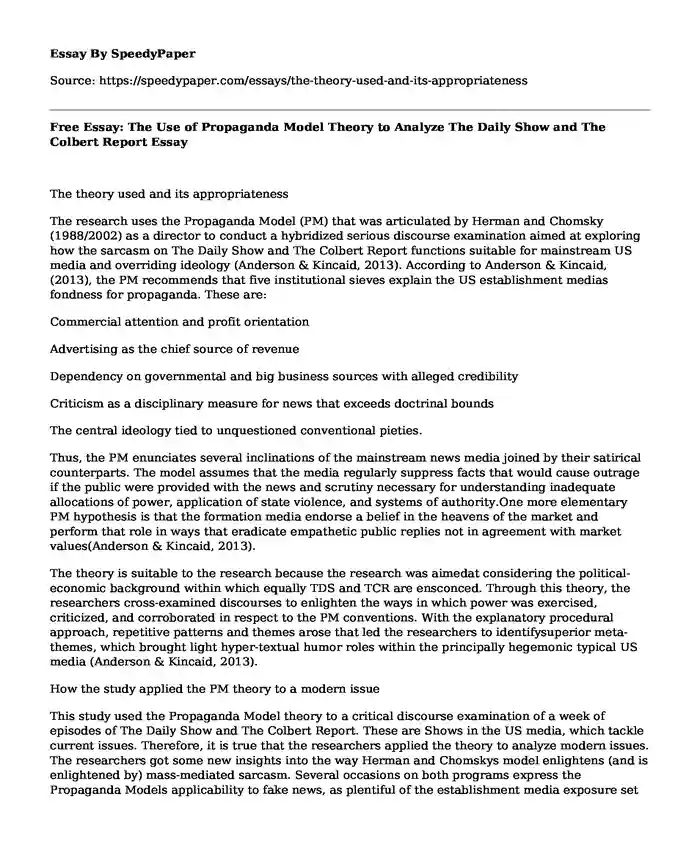
| Type of paper: | Essay |
| Categories: | Company Government Personality |
| Pages: | 4 |
| Wordcount: | 827 words |
The theory used and its appropriateness
The research uses the Propaganda Model (PM) that was articulated by Herman and Chomsky (1988/2002) as a director to conduct a hybridized serious discourse examination aimed at exploring how the sarcasm on The Daily Show and The Colbert Report functions suitable for mainstream US media and overriding ideology (Anderson & Kincaid, 2013). According to Anderson & Kincaid, (2013), the PM recommends that five institutional sieves explain the US establishment medias fondness for propaganda. These are:
Commercial attention and profit orientation
Advertising as the chief source of revenue
Dependency on governmental and big business sources with alleged credibility
Criticism as a disciplinary measure for news that exceeds doctrinal bounds
The central ideology tied to unquestioned conventional pieties.
Thus, the PM enunciates several inclinations of the mainstream news media joined by their satirical counterparts. The model assumes that the media regularly suppress facts that would cause outrage if the public were provided with the news and scrutiny necessary for understanding inadequate allocations of power, application of state violence, and systems of authority.One more elementary PM hypothesis is that the formation media endorse a belief in the heavens of the market and perform that role in ways that eradicate empathetic public replies not in agreement with market values(Anderson & Kincaid, 2013).
The theory is suitable to the research because the research was aimedat considering the political-economic background within which equally TDS and TCR are ensconced. Through this theory, the researchers cross-examined discourses to enlighten the ways in which power was exercised, criticized, and corroborated in respect to the PM conventions. With the explanatory procedural approach, repetitive patterns and themes arose that led the researchers to identifysuperior meta-themes, which brought light hyper-textual humor roles within the principally hegemonic typical US media (Anderson & Kincaid, 2013).
How the study applied the PM theory to a modern issue
This study used the Propaganda Model theory to a critical discourse examination of a week of episodes of The Daily Show and The Colbert Report. These are Shows in the US media, which tackle current issues. Therefore, it is true that the researchers applied the theory to analyze modern issues. The researchers got some new insights into the way Herman and Chomskys model enlightens (and is enlightened by) mass-mediated sarcasm. Several occasions on both programs express the Propaganda Models applicability to fake news, as plentiful of the establishment media exposure set the terms for periodic drama. Additionally, the selective impaling of leading discourses and the actual perilous content of their humor remained largely within doctrinal restrictions (Anderson & Kincaid, 2013).
The project exposes hints of counter-hegemony inside the dissertations of TDS and TCR shows. Comedic denigrations on both shows mostly stayed within the unspoken institutional bounds, but their sarcasm also stripped media messages and misconfigured constituents of dominant philosophy presenting conventional frames and accounts as questionable and substance to contestation and precarious appraisal (Anderson & Kincaid, 2013). Both TDS and TCR endorsed the questioning essential for knowledgeable dissent, deliberation, and determinative democratic culture. Commercial news obeys to PM predictions and signifies a hegemonic understanding of the creation. The proposers of the PM theory enlightened the general perspective of focused power does not mean strong argument cannot take place in the media. Actually, dissent and troublesome information are kept within limits and at the boundaries, so that while their occurrence shows that the system is not monumental, they are not large to obstruct unduly with the control of the official program (Anderson & Kincaid, 2013).
Summary of the findings
Based the analysis, the researchers found that, Stephen Colberts personality personifiesthe absurdity of sociopolitical caricature. Stephen is an ironic example of the popinjay packed media overreliance, a barbed assessment of the PM-confirming, preaching pseudo-intellectual culture parity excellence. Secondly, confusing and clarifying, Colbert symbolizes a short-lived denial of the annulment (Anderson & Kincaid, 2013). The dissertation on TCR reifies the tension, propagandizing while informative and vice versa.
Both TCR and TDS exhibited elementsin accord with and hostage to the PM, but TDSperformed far better in meeting and exceeding the prospects of the PM theory just as it contained humorous skewering with seeminglygreater latent to defy the status quo (Anderson & Kincaid, 2013). The inseparability of satiric usage, content, character, and parody within the dialectical comedy turbulence of TCR, it'sarbitrated spiral of comical propaganda offers hegemonic inconsistency rooted within it and in post-modern entrepreneurship.
Following their findings, the researchers suggested future research to explore how, and the diverse degrees to which, sardonic news parody lineups, like TDS and TCR, propagandize on behalf of influential interests (Anderson & Kincaid, 2013). They also proposed that future researcher could focus on how the paretic news defiantly performs entertainment services for the watching public services that couldintensify critical collectiveawareness. The story expands the hegemonic topography in a fundamentally humanistic and possibly humorous direction.
Reference
Anderson, J. & Kincaid, D. (2013). Media subservience& satirical subversiveness: the Daily show and the Colbert report the propaganda model & the paradox of parody. Critical studies in media communication, 30(3), 171-188.
Cite this page
Free Essay: The Use of Propaganda Model Theory to Analyze The Daily Show and The Colbert Report. (2020, Apr 28). Retrieved from https://speedypaper.com/essays/the-theory-used-and-its-appropriateness
Request Removal
If you are the original author of this essay and no longer wish to have it published on the SpeedyPaper website, please click below to request its removal:
- Essay Example on Biometric Systems: Privacy, Crime, and Fraud
- Homesickness - Personal Experience Essay Example
- Free Essay: Ethical Debates Regarding Treatment of Individuals with Developmental Disabilities
- Free Essay Example on the Role of Place in Shaping Culture
- Free Essay Discussing the Ethical Dilemma: Military Vehicle Licensing
- Essay Example: E-Learning for Training and Potential Barriers
- Free Essay - The History of US Law Enforcement
Popular categories




